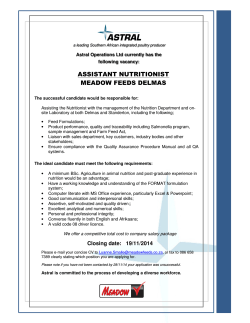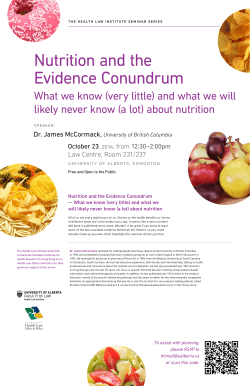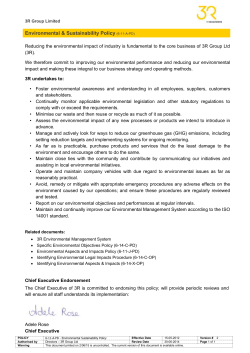
Metrics of Sustainable Diets and Food Systems Insights from a multi
Watch Letter n°32 - April 2015 Metrics of Sustainable Diets and Food Systems Insights from a multi-institutional research partnership Martine Padilla Professeure Associée CIHEAM-Montpellier Paolo Prosperi CIHEAM-Montpellier Montpellier SupAgro, Moïsa University of Catania, Di3A, Italy Bruce Cogill Bioversity International, Nutrition and Marketing Diversity Programme Programme Leader Thomas Allen Bioversity International, Nutrition and Marketing Diversity Programme Postdoctoral Research Fellow Iuri Peri Professor University of Catania, Di3A, Italy Acknowledgements Bruce Cogill and Thomas Allen’s work was supported by The Daniel and Nina Carasso Foundation and the Agriculture for Nutrition and Health Research Programme of the CGIAR. Watch Letter n°32 - April 2015 Joint efforts towards sustainable food security Global and regional food consumption trends and climate change are critical for sustainability. The dynamic linkages between food consumption patterns and environmental concerns have recently received considerable attention from the international and scientific community. Sustainable diets and food systems have emerged as central issues. In particular, the Mediterranean region presents several socioeconomic and biophysical conditions leading to food insecurity and unsustainability, jeopardizing ecosystems, and affecting society with significant social and economic implications such as obesity and non-communicable foodrelated diseases. The Metrics of Sustainable Diets and Food Systems project is a multi-institutional initiative realized in partnership by Bioversity International and CIHEAM-Montpellier (20132014) that aims at exploring the different approaches to the assessment of sustainability of diets and food systems, establishing a multidisciplinary taskforce of experts and identifying a shortlist of indicators for sustainable diets and food systems to inform policy-makers. The initial focus was on the Mediterranean region. The research approach builds on the assumptions that sustainability assessment aims at capturing the ability of a system to maintain and enhance its essential functions over time, and that sustainability addresses threats to preserving life support systems, including their capacity to withstand and adjust. Assessment of stocks of and changes in human and natural assets was considered crucial. Derived from sustainability sciences, the scientific approach was based on the theories of vulnerability and resilience within the social-ecological systems frameworks, in order to analyze the sustainability of critical food and nutrition security issues. A double set of drivers of change and context-specific food and nutrition security issues were identified at a sub regional or national level. This theoretical modeling exercise allowed the identification of a first suite of indicators. A reduced pool of metrics was then obtained through an expert-based elicitation process (Delphi Survey), moving beyond subjective evaluation and reaching consensus. Background Today almost 800 million people worldwide are chronically undernourished and more than 2 billion are malnourished, of which approximately 500 million are obese. Unsustainable models of development are depleting the natural environment, jeopardizing ecosystems and biodiversity that are necessary for our future food supply. Claims for deep changes in our agricultural and food systems are being increasingly and strongly reiterated. Sustainable food systems and diets are, therefore, increasing the awareness from the scientific community and policymakers, acknowledging that the cross-cutting issues through agriculture, nutrition and health, are getting more and more important for identifying solutions to malnutrition. Concurrent undernutrition, nutrient deficiencies, overweight and obesity – the triple burden of malnutrition – is calling for reconsidering health and nutrition as the primary aim of food systems. Although the extraordinary progress of agriculture and food industry during the 20th century, still health and nutritional needs have not been wholly achieved, and unexpected consequences, including environmental losses, have been generated. Most of the world's biogeographical regions, including the Mediterranean area, are experiencing exceptional weather events caused by climate change and habitat loss, in turn further threatening global food and nutrition security. The co-existence of food crises with rising environmental depletion urgently calls for finely exploring and understanding the causes and facilitating adaptation and mitigation, through novel analyses and new paradigms. Food security and Food system sustainability Building on the 1987 Bruntdland Report, actions following the 1996 World Food Summit were directed for reaching food and nutrition security through an environmentally and socially sustainable way. The Sustainable Development Goals proposals are strongly confirming the initial Sustainable Development precepts of maintaining and enhancing economic, social, and environmental conditions for present and future generations. Along this understanding of sustainability, participants at the 2010 international conference organized by Bioversity International and the Food and Agriculture Organization (FAO) of the United Nations defined Sustainable Diets as "those diets with low environmental impacts which contribute to food and nutrition security and to a healthy life for present and future generations. Sustainable diets are protective and respectful of biodiversity and ecosystems, culturally acceptable, accessible, economically fair and affordable; nutritionally adequate, safe and healthy while optimizing natural human resources". This concept emphasizes the food and nutrition security purpose of food systems, and the need to maintain or enhance this outcome over time - across generations - by preserving essential human and natural assets and the flows of services they provide. The concept of Sustainable Diets promotes economically, socially and environmentally sustainable food systems that concurrently ensure food and nutrition security. Working on sustainable diets and food systems demands taking complexity seriously and considering different causes and outcomes of the socioeconomic and biophysical aspects under global change conditions. Economic growth, climate change, and dietary transitions represent major trends that need to be understood through developing models for sustainable diets. Analyzing the intertwining of the several dimensions, around and within food production and consumption and the environmental and socioeconomic boundaries, requires going beyond one-dimensional solutions, but rather focusing towards strong system thinking. Integrated metrics, in a multidisciplinary way, are key for identifying interventions on sustainable diets accounting for the issues related to access and affordability of foods, environmental sustainability, cultural acceptability, and also for considering how the environment, cost, access, culture, policies and other factors impact our nutrition and health. Watch Letter n°32 - April 2015 The triple burden of malnutrition is rising through undernutrition, obesity and also hidden micronutrient deficiencies. By focusing on food and nutrition security as ultimate goal of food systems, the sustainability of diets addresses the challenges of undernutrition, dietary transition and nutrition related chronic diseases and obesity. A comprehensive, sustainable approach to the factors that promote healthy diets and lifestyle can help tackling the nutritional imbalance and the unintended consequences of the global shifts in consumption. The increasing need of the research community for transdisciplinary work on food systems encouraged the rapid development of new research fields. The intensive activity of monitoring realized through the several United Nations' assessment initiatives on ecosystem conservation, climate change and sustainable development, such as the Millennium Ecosystem Assessment, the Intergovernmental Panel on Climate Change (IPCC) and the Sustainable Development Goals recent proposals, provide valuable examples for tackling the understanding of the global dynamics of complex systems. Integrating existing modeling tools to complex food systems can help to properly use metrics for informing policy-makers. Vulnerability is the degree to which a system is likely to experience harm due to exposure to a perturbation or stress, and resilience represents the ability of a system to anticipate, absorb, accommodate, or recover from the effects of a potentially hazardous event in a timely and efficient manner, through ensuring the preservation, restoration, or improvement of its essential basic structures and functions. Within a complex interconnected food system, several global and regional drivers of change affect the structure and processes of the food systems, putting at risk contextspecific food and nutrition security outcomes. The consequent identification of the vulnerability and resilience variables can help to proxy the metrics of sustainable diets and food systems. Vulnerability/Resilience framework (From Allen & Prosperi, 2014) A wide theory-driven and dynamic approach to sustainability For this study we consider that modern societies depend on complex agro-ecological and trading systems to provide food. The move to sustainable diets calls for changes in the agricultural and food systems. Policy-makers and other stakeholders need evidence-based information and assessment tools to lead public policy interventions. Metrics, as an organized information system combined to provide a perspective, target three principal objectives: - Inform civil society, industry, public officials and all stakeholders; Measure progress toward defined goals; Aid decision-making processes. For moving forward on the understanding of sustainable diets and food systems, an enhanced capacity of describing, monitoring and assessing them is needed. Identifying a framework through which develop metrics is then considered key. A sound theoretical framework is the starting point in constructing metrics. Sustainability – or Sustainable Development – is a necessarily complex concept that can have different understandings. We assume that a sustainability assessment aims at capturing the ability of a system to maintain and enhance its essential functions over time. Sustainability addresses threats to preserving life support systems, including their capacity to withstand and adjust. It is then key to assess stocks of and changes in human and natural assets. Derived from Sustainability sciences, the vulnerability and resilience approach, proved relevant to analyze the sustainability of critical food and nutrition security outcomes. Starting from a case study on the Mediterranean Region, but thinking globally, it is observed an ongoing dietary transition coupled with changing life and consumption patterns. In this particular context, rising food cost especially in nutrient-rich and diverse foods, and increasing poverty, is accompanied by increasing consumption of nutrient-poor energy-dense foods and beverages, and widespread obesity and overweight. Data retrieved from the United Nations Environment Programme, the International Union for Conservation of Nature, the World Health Organization and the International Centre for Advanced Mediterranean Agronomic Studies show that in the last 50 years, in this region, water demand doubled, 19% of the species are threatened (declining of biodiversity). Also at least 44% of the inhabitants of this region are food and nutrition insecure, mainly suffering from overweight and obesity. (Prosperi et al., 2014). Watch Letter n°32 - April 2015 Selecting indicators through expert opinion The suggested framework and an initial short-list of indicators were developed in discussions with selected expert focus groups and then submitted to a large panel of experts for further discussion. Following the protocol of the Delphi Survey approximately 50 experts from more than 40 academic and policy institutions in the world were asked to discuss and complement the framework and the underlying assumptions, and to test the framework by selecting proxy indicators. A Delphi Survey is an acknowledged research technique whose aim is to obtain a reliable group opinion from experts; it is a group interaction process directed in iterative rounds of opinion collection and feedback. After a first open-ended round, panelists were presented with the opportunity to justify or amend their first choices. Succeeding rounds have been designed to bring the group to focus or consensus. An upgraded framework and a restricted set of indicators were reached, after three rounds, from this consultation process. The importance of a multi-institutional initiative The scientific community is strongly encouraged, by policymakers and stakeholders, for assessing the multiple impacts of the food we produce and consume. The Bioversity International and CIHEAM Montpellier's initiative proposes an innovative and challenging program to analyze and measure sustainable diets and food systems. In November 2014, Bioversity International and CIHEAM Montpellier, with the support of The Daniel & Nina Carasso Foundation and CGIAR, gathered approximately 30 people from various academic and policy organizations mainly from the Mediterranean Region, Europe, North Africa and North America to learn about our work focused on studying and promoting sustainable diets and food systems. The issue of food and nutrition security, as a final outcome of food systems, and the form of the contribution of dietary pattern changes to sustainability goals, were explored. The concepts of vulnerability and resilience were further analyzed as an approach to capture the food system as a whole, think prospectively and identify the system elements that policy can leverage. Decision-makers need accurate description and monitoring of changes over time through metrics of sustainable food systems. This research partnership is providing useful scholarly publications that acknowledge the scientific basis and robustness of the conceptual and methodological framework to assess sustainable diets and food systems. The Delphi method, and the participation of several experts coming from different institutions, concerned with topics and various experiences related to the sustainability of food systems from multiple disciplines and regions, help advance in the process of providing policy-makers with transparent and effective information. Consensus on information to transfer to policy-makers is key. These new partnerships and networks around Sustainable Diets and Food Systems imply strong transdisciplinary participation with experts in metrics, nutrition, economics, ecology and agriculture called to select a reduced set of 24 metrics from an initial list of 136 and identify consensus and further openings. Only eight interactions between drivers and food system outcomes within a set of sixteen were studied. Consensus is finally reached for 14 of the 24 desired indicators: 8 indicators have met the high threshold consensus criteria (80%), 3 the medium threshold consensus criteria (70%) and another 3 the low threshold consensus criteria (60%). Another 4 indicators have been selected by the majority of the participants (above 50%). For 5 dimensions, clear bipolarity can be reported. All these indicators will soon be published and made available to analysts and policy makers. Joint efforts and integrated interventions allow developing sustainable actions and science needs discussion between and within disciplines, stakeholders, and agreements on evidence, common references and approaches. Inputs from the multidisciplinary group of Delphi participants globally acknowledged the importance of analyzing the potential impacts of a set of global and regional biophysical and socioeconomic changes on a set of food and nutrition security issues specific to the area considered, and the related recovery potentials. In particular, the analysis of issues related to the nutritional quality of food vis-à-vis biophysical changes, such as water depletion and biodiversity loss, allowed the identification of specific metrics. Also, the study of issues related to the affordability of food confronted with food price volatility has brought to the definition of the indicators needed. Still, further research is needed for analyzing the potential impacts of the loss of biodiversity on issues related to the satisfaction of food preferences, and the potential interactions between the changes in consumption patterns and the dietary energy balance, in order to identify the most valuable and specific metrics. Food security and food system sustainability dynamics are still not adequately seized through integrated models because of the lack of quantitative metrics. Also various sources of information and data are still not considered at different stakeholders levels by decision- and policy-makers. Researchers are challenged to join efforts with stakeholders of the food systems to identify gaps in data use and availability to adequately inform policy-makers. Global change impacts and responses necessitate to be characterized in specific socioeconomic and biophysical context. There is a persistent call for a strong interdisciplinary effort implicating life science, earth and environmental science, agriculture and nutrition, and social and sustainability science to better understand the issues of global change and food security, not merely in integrating multiple biogeophysical and socioeconomic factors into global change and food and nutrition security analysis, but also in interchanging and networking current evidences and knowledge in various disciplines. Watch Letter n°32 - April 2015 Bibliography / More information − Allen, T. & Prosperi, P. (2014). Metrics of Sustainable Diets and Food Systems. Workshop Report. November 4-5, 2014 – Montpellier, France. Bioversity International & CIHEAMMontpellier. − Allen, T., Prosperi, P., Cogill, B., & Flichman, G. (2014). Agricultural biodiversity, social–ecological systems and sustainable diets. Proceedings of the Nutrition Society, 73(04), 498-508. − Bioversity International & CIHEAM-Montpellier (2014). Identifying appropriate Metrics of Sustainable Diets and Food Systems: a Delphi expert consultation. Technical Brief 1.0-2014. 12 March 2014. Bioversity International & CIHEAM-Montpellier. − CIHEAM (eds), Mediterra 2012. La diète méditerranéenne pour un développement régional durable, CIHEAM, Presses de Sciences Po, Paris, 2012. − Cogill, B. (2015). Reaching Across the Metaphorical Divide: Understanding Sustainable Diets and Food Systems. Landscapes for People, Food and Nature. [online] http://peoplefoodandnature.org/blog/reaching-across-themetaphorical-divide-understanding-sustainable-diets-and-foodsystems/ (Accessed March 2015). − Giorgi, F. (2006), Climate change hot-spots, Geophysical Research Letters, 33, L08707. − Fanzo, J., Cogill, B., & Mattei, F. (2012). Metrics of sustainable diets and food systems. Technical Brief. Rome: Bioversity International. − Food and Agriculture Organization of the United Nations & Bioversity International (2012). Sustainable diets and biodiversity: Directions and Solutions for Policy, Research and Action. Proceedings of the International Scientific Symposium: Biodiversity and sustainable diets united against hunger. 3–5 November 2010 - FAO Headquarters. Rome: FAO. − Johnston, J. L., Fanzo, J. C., & Cogill, B. (2014). Understanding sustainable diets: a descriptive analysis of the determinants and processes that influence diets and their impact on health, food security, and environmental sustainability. Advances in Nutrition: An International Review Journal, 5(4), 418-429. − Padilla, M. (2008). ‘Dietary patterns and trends in consumption’, in CIHEAM (Eds) Mediterra 2008: The future of agriculture and food in Mediterranean countries, CIHEAM, Presses de SciencesPo, Paris, pp.149-170. − Prosperi, P., Allen, T., Padilla, M., Peri, I., & Cogill, B. (2014). Sustainability and Food & Nutrition Security: A Vulnerability Assessment Framework for the Mediterranean Region. SAGE Open, 4(2). − Sustainable Development Solutions Network. (2015). Indicators and a Monitoring Framework for Sustainable Development Goals: Launching a data revolution for the SDGs. A report by the Leadership Council of the Sustainable Development Solutions Network. Revised working draft fro consultation 16 January 2015. MoU between CIHEAM and IEMed On March 18, 2015, in Barcelona, CIHEAM signed a Memorandum of Understanding (MoU) with the European Institute of the Mediterranean (IEMed) in order to reinforce the relationships between the two organisations for scientific and research programmes in the Mediterranean region. CIHEAM and IEMed agreed that some issues are main areas of common interest to pursue collaborations (EuroMediterranean Relationships, Food Security, Food Safety and Mediterranean Diet, Climate Change and Environment, Trade Markets, Rural Development, Youth Employment and Empowerment, Agenda post-2015/Sustainable Development Goals (SDGs) and the Mediterranean Dimension…) The MoU was signed in the frame of a joint seminar organized in Barcelona on March 18, 2015, in which different high-level speakers coming from Mediterranean countries discussed the main food challenges in the region. IEMed is a public consortium formed by the Government of Catalonia, the Spanish Ministry of Foreign Affairs and Cooperation and Barcelona City Council, acting as a centre of studies and Mediterranean prospective analysis at the service of public authorities, enterprises and bodies and associations whose field of action is the Mediterranean area, and as an observatory of the Euro-Mediterranean Process and migrations in the Mediterranean, fostering exchanges and mutual awareness between the Mediterranean societies and cultures, thereby contributing to the construction of a EuroMediterranean space of peace, stability and shared prosperity and cooperation and dialogue between cultures and civilisations. Webography − www.bioversityinternational.org/metrics-sustainable-dietssymposium/
© Copyright 2025









